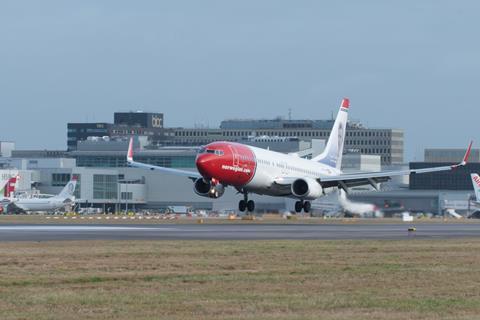Restructuring low-cost carrier Norwegian has warned that it will require further financing next year to survive the winter as coronavirus-related travel restrictions continue to hamper the recovery in air travel.
Norwegian today posted a net loss of NKr5.3 billion ($595 million) for the first half of 2020, a period in which passenger levels dropped from 18.1 million to 5.3 million as international passenger flights came to a virtual standstill in the second quarter.

The carrier has been in ‘hibernation’ mode since the crisis began – expecting to operate between 20 and 30 aircraft for the remainder of the year before stepping up services next summer – and required a major financial restructuring to tap vital rescue aid from the government.
Under that restructuring, lessors swapped debt for equity, giving them significant holdings in the airline, which in turn unlocked NKr3 billion in state-guaranteed loans.
“The Covid-19 crisis has impacted aviation and the travel industry particularly hard, and most companies need government support to survive,” says Norwegian chief executive Jacob Schram.
“We are thankful for the loan guarantee made available to us by the Norwegian government, which we worked hard to obtain. However, given the current market conditions it is not enough to get through this prolonged crisis.”
The company notes the financial restructuring, which also included a public offering, resulted in improvements to its equity position by NKr15.3 billion during the first half of 2020.
But it adds that even with this, the restructuring of aircraft and vendor financings is still ongoing.
”There is significant uncertainty surrounding the long-term effects of the Covid-19 pandemic,” Norwegian says. ”The company currently estimates that it will need additional working capital during the first quarter of 2021 to meet its obligations in the upcoming twelve-month period.
”The company expects to obtain additional working capital through additional financing, additional private placement of shares, reconsidering the company’s business plan and scale of operations, selling and refinancing assets or pursuing other sources of finance.”
But while the company believes there are ”reasonable prospects to resolve potential defaults and obtain necessary working capital”, it flags there is a significant risk that the company becomes insolvent and enters into bankruptcy if it is unable to reach an agreement with its creditors, access working capital and regain normalised operations.
“For the past months we have been working tirelessly to make sure that we can emerge from this crisis as a stronger company, well positioned for future competition,” says Schram.
”Some of these measures have been painful, but totally necessary if we are to make it through at all. Creditors, bondholders and shareholders have shown us support and trust to find a way forward for the company and our customers are expressing their strong support, for which I am grateful.”


























